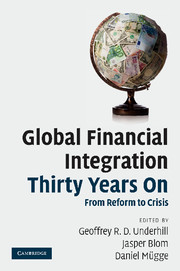Book contents
- Frontmatter
- Contents
- List of figures
- List of tables
- Notes on contributors
- Preface
- Acknowledgements
- List of abbreviations
- Introduction: the challenges and prospects of global financial integration
- Part I History and context: input, output and the current architecture (whence it came)
- 1 Financial governance in historical perspective: lessons from the 1920s
- 2 Between the storms: patterns in global financial governance, 2001–2007
- 3 Deliberative international financial governance and apex policy forums: where we are and where we should be headed
- 4 Finance, globalisation and economic development: the role of institutions
- Part II Assessing the current financial architecture (how well does it work?)
- Part III Does the future hold? Reactions to the current regime and prospects for progress (where is it going?)
- Conclusion: whither global financial governance after the crisis?
- References
- Index
4 - Finance, globalisation and economic development: the role of institutions
Published online by Cambridge University Press: 02 December 2010
- Frontmatter
- Contents
- List of figures
- List of tables
- Notes on contributors
- Preface
- Acknowledgements
- List of abbreviations
- Introduction: the challenges and prospects of global financial integration
- Part I History and context: input, output and the current architecture (whence it came)
- 1 Financial governance in historical perspective: lessons from the 1920s
- 2 Between the storms: patterns in global financial governance, 2001–2007
- 3 Deliberative international financial governance and apex policy forums: where we are and where we should be headed
- 4 Finance, globalisation and economic development: the role of institutions
- Part II Assessing the current financial architecture (how well does it work?)
- Part III Does the future hold? Reactions to the current regime and prospects for progress (where is it going?)
- Conclusion: whither global financial governance after the crisis?
- References
- Index
Summary
Introduction
As discussed in the introductory chapter of this volume (Underhill, Blom and Mügge), across-the-board G7/G10 and IFI pressure for increased capital mobility and capital account openness has been a central feature of the (new) global financial architecture, a policy prescription which a wide range of developing countries have adopted. This chapter critically examines the relationship between financial integration/openness and financial development and, in turn, economic development. In doing so, it evaluates the effectiveness of this input side push towards financial openness to produce (as its output) successful economic development in developing countries.
The belief in the virtues of capital mobility – and the determination with which it is translated into policy advice at the global level (see Baker's chapter in this volume) – is grounded in standard theoretical economic analysis. In theory, financial development should be good for growth as it allows for the efficient mobilisation of savings for productive investments. Furthermore, the development of banks and other financial intermediaries increases the average productivity of capital by reducing problems of adverse selection and moral hazard. Financial openness should enhance financial development, while standard neoclassical growth theory also predicts huge gains for developing countries from financial market integration. Differences in the capital-labour ratio provide scope for increased efficiency in the global allocation of capital. Furthermore, there is scope for improved international risk-sharing and capital deepening.
- Type
- Chapter
- Information
- Global Financial Integration Thirty Years OnFrom Reform to Crisis, pp. 74 - 92Publisher: Cambridge University PressPrint publication year: 2010
- 3
- Cited by



